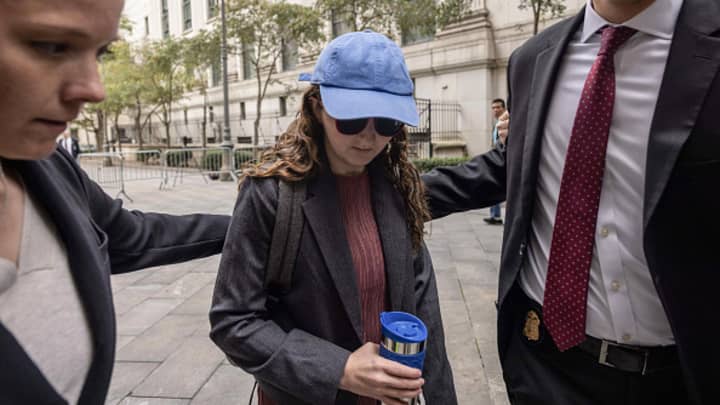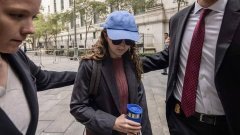
When asked by Sassoon to identify the defendant, Ellison stood up and, for almost 30 seconds, looked around the room. She turned her head all the way to the left to the jury box and back to the right again multiple times before finally identifying Bankman-Fried as sitting "over there and wearing a suit." The two hadn't made eye contact when Ellison walked by earlier. Bankman-Fried, who was known for his floppy hair and beach shorts, got a fresh haircut prior to the trial, reportedly from a fellow inmate at the jail in Brooklyn where he has been held since August.
Ellison said Bankman-Fried was the original CEO and owner of Alameda.
"Sam directed me to commit these crimes," she said. He "directed us to take customer money to pay loans."
Bankman-Fried, 31, faces seven , including wire fraud, securities fraud and money laundering, all tied to the collapse of FTX and Alameda late last year. If convicted in the trial that began a week ago, Bankman-Fried could spend his life in prison. He has pleaded not guilty.
Central to the case against Bankman-Fried is the billions of dollars that flowed from customer accounts at FTX to Alameda, which had a massive hole in its balance sheet after the crypto markets turned in 2022.
Ellison said Alameda took several billion dollars from FTX customers and that Bankman-Fried had not only set up a system to steal the funds, but also directed Ellison and others to use customer funds to repay loans in the ballpark of $10 billion.
"We ultimately took around $14 billion, some of which we were able to pay back," she said. "I sent balance sheets to lenders at the direction of Sam that incorrectly stated Alameda's assets and liabilities."
She said the numbers were adjusted to make Alameda look less risky as an investment.
Following lunch recess, Ellison was asked about her relationship with Bankman-Fried. She said they began dating in the summer of 2021 though they had been sleeping together from time to time before that. The relationship was on-again, off-again until the spring of 2022, when they broke up for good.
Ellison said she quickly discovered after being hired that Alameda was in much worse shape than she'd anticipated. The firm had suffered large losses, lenders had pulled out and many employees had quit.
Regarding the comingling of funds, Ellison said Bankman-Fried was still CEO of Alameda when the practice of funneling money from FTX to the hedge fund began. Ellison said she was under the impression that it was FTX customer money because the sums exceeded the exchange's profits and the amount of capital it had raised.
In mid-2021, when FTX bought equity in the company back from rival exchange and early investor , it used $1 billion in customer money for the transaction, Ellison testified. That followed an in-person conversation between Ellison, Bankman-Fried and Sam Trabucco, Alameda's co-CEO.
"We don't really have money for this," Ellison recalled saying. "We'll have to borrow from FTX to do it."
Bankman-Fried told her that was OK because it was important and "we have to get it done," she said.
Enter the . Bankman-Fried created the digital coin and Alameda initially owned 60% to 70% of the supply, having paid nothing for it. In the heyday of crypto, projects commonly created their own currencies, which often traded on various exchanges in a fashion similar to stocks.
When the FTT token was offered in a seed round, the price was 10 cents. By the time it went public on exchanges in 2019, the price was $1. FTT eventually traded at about $50 a token, lifting Alameda's stake to billions of dollars.
Ellison said she was instructed to put FTT coins on Alameda's balance sheet to get more loans from companies like Genesis. Ellison testified that she thought the move was misleading, though she said Bankman-Fried reassured her that it would be a separate item and it was OK.
Other crypto coins were also added to Alameda's balance sheet and were internally called "Sam coins." Solana and Serum were examples.
Another problem Ellison highlighted was the roughly $5 billion in personal loans that Alameda gave to insiders, including a $35 million loan to former top FTX executive Ryan Salame that went to donations for Republican political candidates. Ellison said she learned of the loans when she was preparing Alameda's balance sheets.
Ellison said she was concerned about the loans because they were going to really "illiquid things like early-stage companies." Due to the structure of the loans, they could be called at any time, creating the risk that Alameda would be pushed into bankruptcy.
"Sam directed us to borrow as much money as we could at whatever terms we could," she testified.
Ellison said her analysis showed that Alameda had $9.4 billion in loans from third-party lenders, and $8 billion in liquid assets. Subtracting "Sam's coins," the net asset value was negative $2.7 billion.
Bankman-Fried gained attention for his hefty political donations, which he said were "very effective," with "very high returns in terms of influence by spending relatively small amounts," according to Ellison. She gave the example of a $10 million donation from Bankman-Fried to U.S. President Joe Biden's presidential campaign.
Ellison testified that her base salary was $200,000, with two bonuses a year, ranging from $100,000 to $20 million. She also received compensation in FTX equity, equal to about 0.5% of the company.
— CNBC's Dawn Giel contributed to this report.
WATCH:



